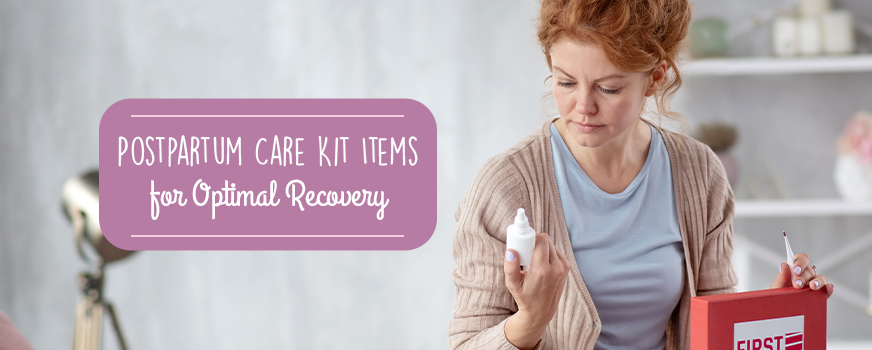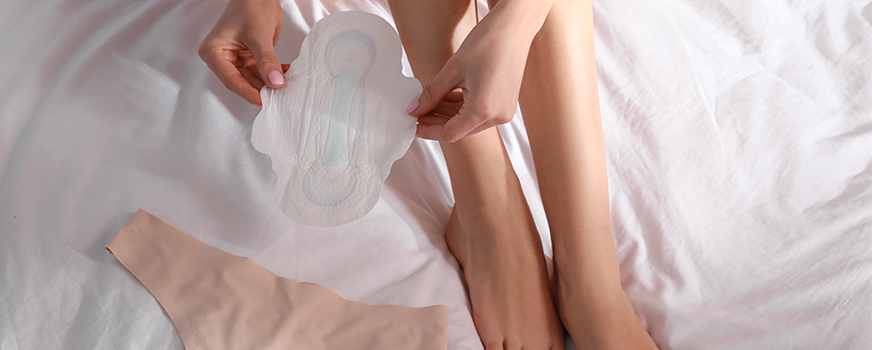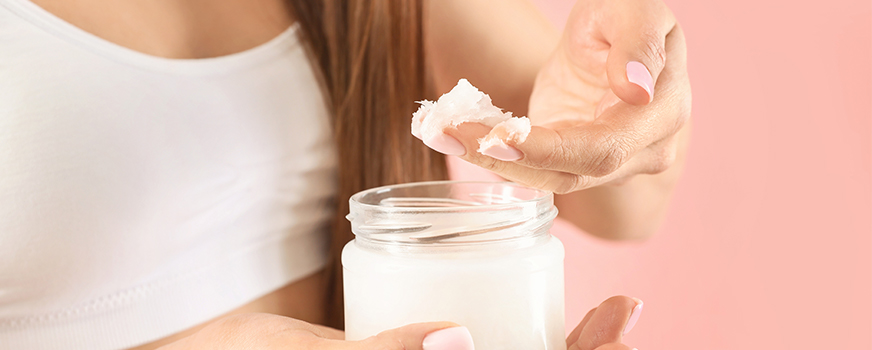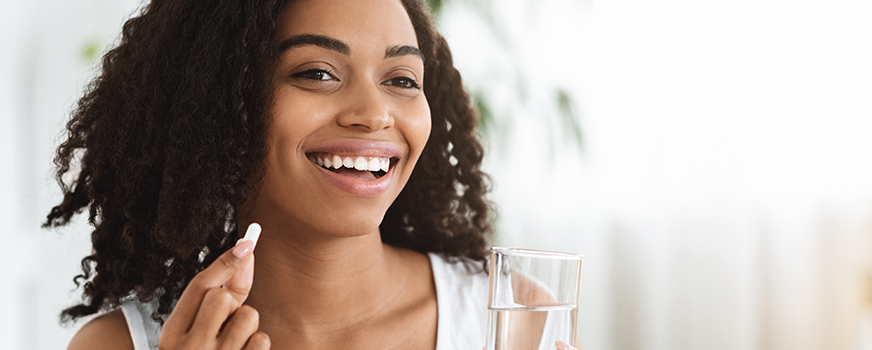
After a long 9+ months of pregnancy and trying to conceive, one of the most important steps in your pregnancy is what happens after labor during postpartum recovery. The excitement of meeting your new baby likely got you through some of the roughest patches of pregnancy. Now that your baby has arrived, you may have been mentally prepared for the feedings, diaper changes, and sleepless nights, you might not have considered how you’d also need to care for yourself in the weeks after birth.
Packing a postpartum care kit can help with your recovery and make new parenthood easier. Find some of the best postpartum recovery essentials to make your recovery as comfortable as possible.
Postpartum Recovery Tips
During the first six weeks of postpartum recovery after delivery, new moms experience a wide range of symptoms depending on how you delivered and if you are breastfeeding. You can expect to have some amount of postpartum bleeding, perineal pain, sore nipples, and mood changes, among other symptoms. It’s important to be extra kind to yourself: Your body just got you through what’s likely the most enormous physical task of your life.
During your first few weeks after giving birth, focus on self-care as much as you can and give yourself time to recover. This can include:
- Following your doctor’s tips to help your perineum heal
- Taking steps to relieve aches and pains throughout your body
- Continuing to do your Kegels
- Going to all scheduled doctor appointments
- Eating a lot of fiber and drinking plenty of water to fight constipation
- Taking short walks to speed recovery and boost your mood
With the right self-care, you’ll be feeling like yourself again sooner rather than later. To help you heal and ease the transition into new parenthood, it can also help to build a postpartum recovery kit while you’re still pregnant so you’re prepared once you are home and in recovery mode.

Postpartum Recovery Essentials
Cooling Nipple Pads
Until you get into the swing of nursing, the first few days can be rough on your sore, cracked nipples. Cooling nipple pads help soothe and heal nipples and can be stored in the refrigerator for added cooling comfort. Just like cooling perineal pads, the coldness can help ease the discomfort and make postpartum healing a little more manageable when juggling everything else.
Kegel Exercise Weights
Postpartum Kegel exercises are key to reducing the risk of incontinence and other pelvic floor issues post-birth. While you definitely won’t want to introduce any foreign objects into your vagina for the first six to eight weeks postpartum due to infection risk, talk to your doctor about if and when you can try using Kegel weights at your first postpartum checkup.
Maternity Pads
As your uterus sheds the lining that was your baby’s home for the past nine months, you’ll experience vaginal bleeding similar to a long and heavy period. Expect heavy postpartum bleeding for 3-10 days, followed by spotting for another 4-6 weeks. During this time you’ll need to use pads, as tampons can introduce bacteria into the region. If swelling, irritation, or hemorrhoids are particularly intense, medicated pads can help provide additional relief.
Mesh Underwear
Heavy postpartum bleeding may ruin your favorite pair of underwear, so a few pairs of disposable underwear will be your best friend for the first few days after birth. Mesh underwear might sound uncomfortable, but you can easily find a few pairs of stretchy, breathable, cotton-like underwear to help keep you comfortable and your pads in place without the worry of ruining your favorite pair at home.
Nursing Bra
If you’re breastfeeding, a well-fitting, comfortable nursing bra is one staple of your postpartum wardrobe you really can’t live without. Find a bra that is soft even on sore, cracked nipples and is stretchy, so you can quickly and easily pull it out of the way during middle-of-the-night feedings. One with no hooks, plastic, or metal and offers all-over support with easy breastfeeding access will be the most comfortable for sleep.

Organic Coconut Oil
Many moms love lanolin cream for sore nipples, but it can cause skin sloughing and, because it’s relatively thick, may need to be wiped off before breastfeeding. A low-tech alternative: organic olive oil or coconut oil, which helps soothe and moisturize irritated skin. Make sure to get high-quality coconut oil, as you want the healthiest option for when the baby is breastfeeding.
Pain Reliever
The last uterine contractions unfortunately don’t end once the baby arrives. Expect abdominal cramps, known as afterpains, for the first four to seven days after delivery as your uterus contracts. You’ll also experience perineal discomfort and pain from your vaginal delivery – especially if you had stitches – and all-over achiness from pushing. It’s safe to use ibuprofen after pregnancy and while breastfeeding unless your doctor has advised you otherwise.
Peri Bottle
A postpartum perineal hygiene routine is essential to prevent infection of the perineum and the genital tract, especially if you had an episiotomy or tearing during your vaginal birth. Your doctor will recommend rinsing your perineum with warm water or an antiseptic solution during and after urination to reduce burning and keep the area clean. A peri bottle has an angled neck to make it even easier to get at hard-to-reach areas.
Perineal Cooling Pads
Applying a cooling pad to your perineum every couple of hours for the first day or so following a vaginal delivery helps to reduce swelling and discomfort. Frozen peas in a zip-up bag can do the trick in a pinch, although there are plenty of other more “official” options such as disposable maxi pads that also act as cooling pads that absorb lochia bleeding and don’t need to be frozen: Simply open the pack and insert into underwear.
Perineal Spray
Talk to your doctor about using a local anesthetic in a spray, cream, ointment, or pad to relieve postpartum perineal pain. Dermoplast spray contains benzocaine, aloe, lanolin, and menthol to soothe and moisturize damaged skin. Bonus: It has uses well beyond delivery, relieving the discomfort of all types of scrapes, cuts, burns, and insect bites, making it a perfect addition to your first aid kit as well.

Prenatal/Postnatal Vitamins
Many practitioners recommend new moms continue to take a daily prenatal vitamin after delivery – especially those who are breastfeeding. Eating a healthy diet can get you most of the vitamins and minerals you will need, but taking prenatal/postnatal vitamins and supplements can support a healthy postpartum recovery and a healthier breastfeeding experience if that is the path you are planning to take.
Sitz Bath Soak
Sitting in a warm bath once a day for 15 to 20 minutes – i.e., taking a sitz bath – can help ease perineal pain in the days after delivery by relaxing muscles, soothing soreness, and reducing itching. Sitz baths also promote healing by increasing blood flow and keeping the area clean. Ask your doctor about adding Epsom salts with ingredients like witch hazel, lavender oil, or chamomile, which may offer added relief.
Stool Softener
Between weakened abdominal muscles and constipation-causing pain medications, it’s normal to be stopped up post-delivery. Many moms also experience hemorrhoids carried over from pregnancy or from pushing during delivery. To battle postpartum constipation and get your system back on track, fill up on fiber, drink plenty of water and take a leisurely walk. With your doctor’s approval, you may want to try a mild laxative.
Packing your postpartum care kit is far from the most glamorous part of pregnancy. With stool softeners and cooling pads, these items are probably on your list of wish-I-didn’t-haves but should definitely be part of your must-haves list. Try to stock up on these items before the baby arrives and for when you don’t have time to go to the store or can’t wait for 2-day shipping. During your postpartum experience, the most important thing is the proper comfort for you and your baby. If you aren’t comfortable, it’ll be harder for the baby to get comfortable too! Be sure to take care of yourself while your body heals.



